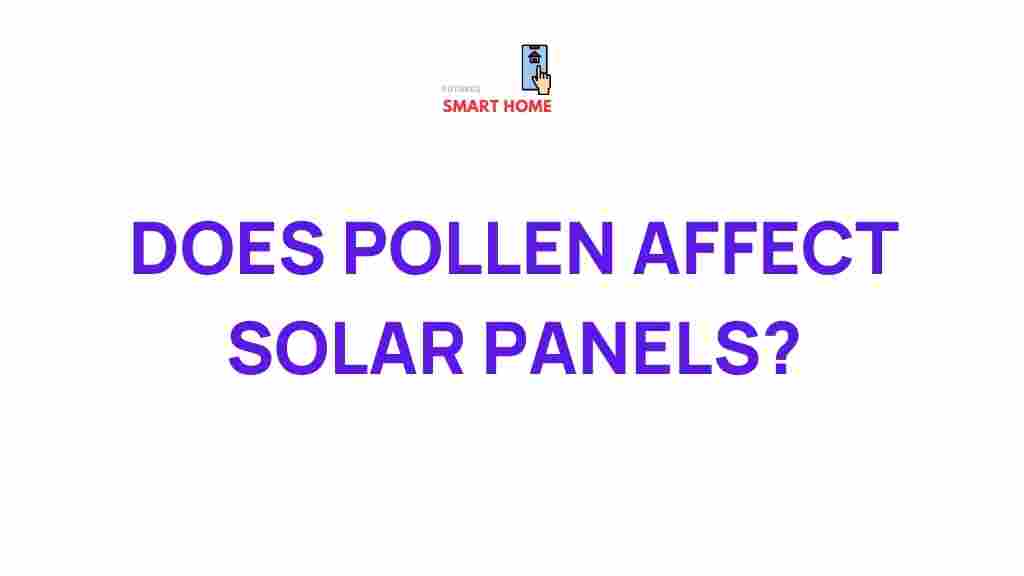Uncovering the Surprising Connection Between Pollen and Solar Panels
As we embrace renewable energy sources, solar panels have emerged as a popular choice for reducing our carbon footprint and harnessing the sun’s energy. However, what many people might not realize is that pollen, a natural byproduct of plant reproduction, can significantly impact the efficiency and maintenance of solar panels. Understanding this connection is essential for maximizing the performance of solar panels and ensuring they function optimally. In this article, we’ll explore how pollen affects solar panel efficiency, the importance of regular cleaning and maintenance, and the broader implications for the environment.
The Impact of Pollen on Solar Panels
Pollen can accumulate on solar panels, creating a layer of debris that reduces their efficiency. This buildup obstructs sunlight from reaching the solar cells, which is critical for generating electricity. Here are some key points regarding the impact of pollen:
- Reduced Light Absorption: When pollen settles on solar panels, it acts as a barrier to sunlight, leading to decreased energy production.
- Increased Heat: A dirty solar panel can become hotter than a clean one, which can further reduce efficiency since solar panels are less effective at converting sunlight to electricity at higher temperatures.
- Long-term Damage: If not cleaned regularly, pollen and other debris can cause long-term damage to the solar panels, potentially leading to costly repairs or replacements.
How Pollen Affects Solar Panel Efficiency
The efficiency of solar panels is measured by their ability to convert sunlight into usable energy. Various factors influence this efficiency, and pollen is one of them. The following outlines how pollen affects solar panel performance:
- Energy Output: Studies indicate that solar panels covered with pollen can experience a reduction in energy output of up to 20%. This means that a solar panel that could typically produce 300 watts may only produce 240 watts when covered with a thick layer of pollen.
- Seasonal Variability: Pollen levels fluctuate throughout the year, with spring and early summer being peak seasons. Homeowners must be particularly vigilant during these times.
- Geographical Factors: Areas with abundant vegetation and flowering plants are more prone to pollen accumulation on solar panels.
Maintenance and Cleaning of Solar Panels
To ensure that solar panels function at peak efficiency, regular maintenance and cleaning are crucial. Here’s a step-by-step process for cleaning your solar panels effectively:
Step 1: Assess the Need for Cleaning
Before cleaning, visually inspect the solar panels for pollen accumulation or other debris. If you notice significant buildup, it’s time to clean them.
Step 2: Gather Necessary Supplies
You’ll need:
- Soft-bristle brush or sponge
- Garden hose or bucket with water
- Non-abrasive, eco-friendly soap (optional)
- Safety goggles and gloves
Step 3: Choose the Right Time
The best time to clean your solar panels is during the early morning or late afternoon. Avoid cleaning when the panels are hot, as this can cause water spots.
Step 4: Clean the Panels
Using the soft-bristle brush or sponge, gently scrub the surface of the solar panels to remove pollen and other debris. Rinse thoroughly with water to ensure no soap residue remains.
Step 5: Inspect for Damage
After cleaning, inspect the solar panels for any signs of damage or wear. If you notice cracks or other issues, contact a professional for repairs.
Troubleshooting Tips for Solar Panel Maintenance
If you’re experiencing issues with your solar panels, consider the following troubleshooting tips:
- Check for Obstructions: Ensure that there are no nearby trees or structures casting shadows on your panels.
- Monitor Energy Output: Regularly check the energy output of your solar panels. If you notice a significant drop, it may be time for a cleaning.
- Professional Cleaning Services: If you’re uncomfortable cleaning your panels, consider hiring a professional cleaning service that specializes in solar panel maintenance.
The Environmental Impact of Clean Solar Panels
Keeping solar panels free of pollen and debris is not just about efficiency; it also has broader environmental implications. Here’s how clean solar panels contribute to a healthier planet:
- Increased Renewable Energy Production: Efficient solar panels produce more clean energy, reducing reliance on fossil fuels and lowering greenhouse gas emissions.
- Promoting Sustainable Practices: Regular maintenance of solar panels encourages more homeowners to invest in renewable energy, fostering a culture of sustainability.
- Wildlife Protection: Well-maintained solar farms can coexist with local wildlife, providing habitats and minimizing environmental disruption.
For more information on renewable energy practices, check out this comprehensive guide on solar energy benefits.
Conclusion
The connection between pollen and solar panels may not be immediately apparent, but it plays a crucial role in the efficiency and maintenance of these renewable energy systems. By understanding how pollen affects solar panel performance and implementing regular cleaning and maintenance practices, homeowners can ensure their solar panels operate at peak efficiency. This not only maximizes energy production but also contributes positively to the environment. In embracing renewable energy, we take a significant step toward a greener future, and maintaining the efficiency of solar panels is a vital part of that journey. Remember, a clean solar panel is an efficient solar panel, and every bit of effort contributes to a sustainable world.
For further tips on maintaining your solar panels, visit our maintenance tips page.
This article is in the category News and created by FutureSmarthome Team

1 thought on “Uncovering the Surprising Connection Between Pollen and Solar Panels”